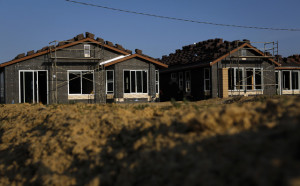Confidence among U.S. homebuilders unexpectedly fell for a second month in March, a sign the residential real-estate market will take time to strengthen.
The National Association of Home Builders/Wells Fargo index of builder confidence dropped by 2 points to 44 this month, due to a decrease in the measure of current sales, a report from the Washington-based group showed today. The median forecast in a Bloomberg survey called for a gain to 47. Readings below 50 mean more respondents said conditions were poor.
“In addition to tight credit and below-price appraisals, homebuilding is beginning to suffer growth pains as the infrastructure that supports it tries to re-establish itself,”David Crowe, chief economist at the builders association, said in a statement. “The road to a housing recovery will be a bumpy one until these issues are addressed, but in the meantime, builders are much more optimistic today than they were at this time last year.”
The group’s gauges of the sales outlook for the next six months and traffic of prospective buyers improved this month, reflecting stable property values, mortgage rates close to all-time lows and job gains. Limited inventories and resilient sales are benefiting builders including PulteGroup Inc. and Lennar Corp., showing housing will contribute to economic growth this year after emerging as a bright spot in 2012.
The builders’ index compares with a reading of 28 in March 2012. Estimates of the 41 economists in the Bloomberg survey ranged from 46 to 49. The index, first published in January 1985, averaged 54 in the five years leading to the recession that began in December 2007. It reached a record low of 8 in January 2009.
Current Sales
The builders group’s index of present single-family home sales fell to a five-month low of 47 in March from 51. A measure of sales expectations for the next six months climbed to 51 from 50. The gauge of buyer traffic advanced to 35 from 32.
“Although many of our members are reporting increased demand for new homes in their markets, their enthusiasm is being tempered by frustrating bottlenecks in the supply chain for developed lots, along with rising costs for building materials and labor,” Rick Judson, the association’s chairman and a builder from Charlotte, North Carolina, said in a statement.
The confidence survey asks builders to characterize sales as “good,” “fair” or “poor” and to gauge prospective buyers’ traffic. It also asks participants to gauge the outlook for the next six months.
By Region
Confidence eased among builders in three of the four U.S. regions. Builders in the Midwest reported an increase in sentiment. Confidence fell to 2 points in March to 57 in the West, dropped 2 points in the Northeast to 39 and decreased 2 points in the South to 42. Sentiment in the Midwest climbed by 5 points to 50.
Builders began work on about 780,000 homes last year, a 28.1 percent increase from 2011 and the most in four years. Even with the gain, housing starts remain well below the 2.07 million in 2005 at the peak of the housing boom.
Cheaper borrowing costs are attracting home buyers who have adequate credit. The average rate on a 30-year fixed purchase loan was 3.63 percent last week, compared with 3.92 percent a year ago, according to McLean, Virginia-based Freddie Mac. The 30-year rate reached a record low of 3.31 percent in November.
Some areas of the country continue to struggle. New York,New Jersey, Florida and Nevada are among 16 states that reported an increase in foreclosure starts in February, according to RealtyTrac Inc., a data company based in Irvine, California.
Florida, Arizona
AV Homes Inc. (AVHI), a developer based in Poinciana, Florida, that specializes in adult communities, reported a fourth-quarter loss driven by falling property values in Florida and Arizona. Still, the company is purchasing land for new developments as buyers return to the market, President and Chief Executive Officer Roger Cregg said.
“The value of their largest asset, their home, has diminished and that has caused them to lose confidence and delay their move and purchase of another home,” Cregg said on a March 15 earnings call. “We believe that as home values continue to rise, they will regain their confidence and be returning to the market.”



